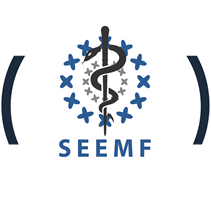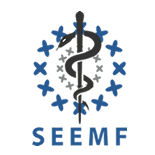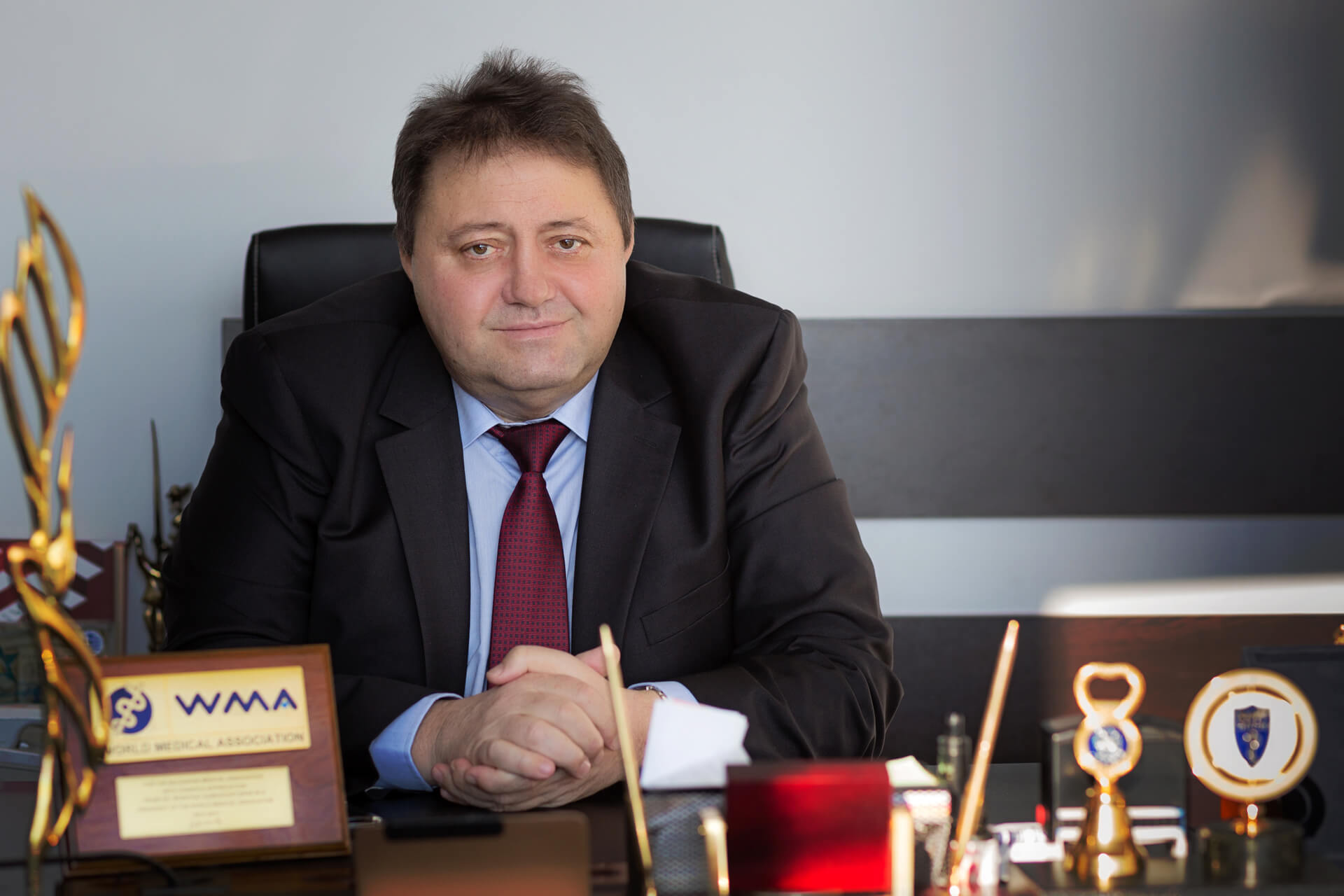Apinis: In 2019 the Southeast European Medical Forum (SEEMF) organizes its Tenth Anniversary International Medical Congress. SEEMF’s congresses take place in different Eastern European countries every year. This year, the Congress will take place in Sofia, Bulgaria. What are the main goals of the events? What are the main topics of this year’s Congress?
Kehayov: The main objectives of SEEMF are to promote partnership between the medical associations of the member countries; to discuss common problems in the healthcare systems in the southeastern part of the European continent; to exchange experience in and develop common approaches towards all fields and activities of the medical organizations; to promote continuous medical education; to assist its members in improving their medical and managerial qualifications and skills; to establish contacts and partnership with other international medical organizations. The scientific program of the Tenth Anniversary Medical Congress of SEEMF is comprised of variety of topics and will host the attendance of leading lecturers, prominent representatives of medical academia with recognized academic and practical competence.
- Aging of the population;
- Cardiovascular diseases and cardiovascular surgery. Transplantations;
- Transplantations;
- Neurology, neurosurgery and psychiatry;
- Nephrology and urology. Transplantations;
- Sexual medicine and reproductive health;
- Orthopedics and traumatology. Calamity medicine;
- Pharmacotherapy;
- Varia.
We hope that during the round table discussion on the topic “Challenges in the Healthcare Systems- 21st Century. Values and Principles” participants will have the chance to share their views on and aspires towards the present and the future of the global healthcare. The Congress has already received the support of the Bulgarian authorities and the World Medical Association. The President of WMA- Dr. Leonid Eidelman has already confirmed his participation. As usual, the Congress will apply for European Accreditation Council for Continuous Medical Education (EACCME) accreditation. The social program of the event will be comprised of several tours- one around Sofia- the capital of Bulgaria; to the Rila Monastery- a historic Christian monument and a visit to the Cultural Capital of Europe for 2019 – Plovdiv, the city with a thousand year old history. I would like to use the opportunity to appeal to all the members of the WMA and the readers of the World Medicine Journal and cordially invite all of you to attend the 10th Anniversary International Medical Congress of the SEEMF. All information about the event – registration and hotel accommodation is available on the website of the organization: www.seemfcongress.com.
Apinis: At present, 18 countries (20 medical organizations) are members of SEEMF’s society – Albania, Azerbaijan, Belarus, Bosnia and Herzegovina, the Medical Associations of Bosnia and Herzegovina and Republika Srpska, Bulgaria, the Czech Republic, Georgia, Greece, Kazakhstan, Russia, Northern Macedonia and Montenegro, Slovenia, Ukraine, Uzbekistan, Serbia, Moldova, Croatia, the European Medical Student Organization. Does SEEMF continue to extend? Do you think that doctors from other countries will join your organization?
Kehayov: Southeast European Medical Forum (SEEMF) was found in 2005 by the medical organizations of 4 Balkan countries – Albania, Bulgaria, Greece and the Republic of Northern Macedonia as an association of doctors’ organizations from Southeastern Europe – neighbouring countries with similar problems. Today, SEEMF is one of the rapidly developing organizations that unites 20 medical associations. Last year, during the Board Meeting held amidst the Ninth International Medical Congress of SEEMF, we approved the applications for membership from Russia, Croatia and Montenegro- our newest member countries. As you can see every year, the membership base of the organization is enriched with new medical experience in the face of its new members. From 4 founders of the organization, we became 20. SEEMF is expanding naturally as a result of its mission and causes, which are also part of the causes and missions of the world medical organizations.
Apinis: Throughout the years, SEEMF’s Congresses have been held in countries with politically unstable situations, an example of which is the Congress in Odessa, Ukraine, at a time when the military conflict in East Ukraine took place. Does SEEMF thus show a political standing?
Kehayov: SEEMF is an independent organization of physicians and is not under any political ward. Our congresses are interdisciplinary events. We are not only interested in scientific and practical achievements in medicine, but also in the organizational structures of the healthcare systems of our members. We outline the real labour market; the problems of financial and human resources and aim to provide guidance for rational solutions. Before the institutions that are involved in shaping the health policies and before the society, we form our unequivocal and prominent physicians’ position in order to find the adequate balance to change the system. These are the real challenges of the time we live in. Through brainstorming together, we raise our experts’ and specialists’ platforms and display them before the various national and international institutions.
Apinis: The Board meetings of SEEMF are often held on The Island of Kos, Greece, where Hippocrates was born. Does this historical reference serve the philosophy of your organization?
Kehayov: In accordance with SEEMF’s Statute, SEEMF organizes at least two board meetings annually. The board consists of 30 individuals, most of whom are heads of the medical associations of the member states and prominent representatives of the medical and academic society. The Board meetings are held in different countries, and this year for a second time we have decided to hold our meeting in Kos, Greece – The homeland of the “Father” of modern medicine – Hippocrates. The mission of SEEMF, as an organization of physicians from different countries, is to transform moral-ethical behaviour and norms that distinguish the medical profession from all other professions as a leading one. Parallel to the Board meeting, we have organized an event with the title “International Conference on Medical Ethics and Moral. Oath of Hippocrates – Symbol of Medicine”. Well- known lecturers will present various moral and ethical models, practices and standards in medicine.
Apinis: Most of the countries, represented in SEEMF, are former post-soviet or post-socialist states. Is it not the debate in your Congress on the transition from socialistic medicine to European medicine?
Kehayov: The discussions that participants in SEEMF’s congresses hold are mainly related to the socially significant diseases and their prevention. However, the primary mission of the doctors and the medical specialists is to take care of the health of their patients and it has nothing in common with the country we come from or live in. SEEMF’s congresses are multidisciplinary universities and one of our main goals is to improve participants’ knowledge and professional qualifications with the latest theoretical and practical achievements of the global medicine. Implementing the established European and global medical standards and practices with a focus on what quality medical care really is, we endeavour towards the improvement of the healthcare systems in the countries of the region.
Apinis: A regular topic during SEEMF’s Congresses is the one about the migration of doctors and medical professionals. Doctors tend to go work in richer European countries and for better wages.
Kehayov: The Migration of the medical professionals in the European region has been observed since the 1940s. After the accession of Bulgaria to the EU, the most active amongst the “migrants” became the medical specialists with qualifications and diplomas that are recognised by member states of the EU. We witness a trend of general migration – Bulgarian doctors migrate, but specialists from other countries come to Bulgaria. This process is two-sided.
Apinis: Medical tourism plays an increasingly important role in EasternEurope. To what extent are Bulgaria and the Balkan countries updating medical tourism?
Kehayov: Due to its enormous natural resources Bulgaria has posed a serious request to become one of the biggest health centers in Europe. Using its endowments and intellectual resources, as well as the hundreds of mineral water springs, healing climate, organic farming and services promoting a healthy lifestyle; cultural, wine, seaside and mountain tourism Bulgaria is turning into a competitive destination for a quality tourism. Bulgaria ranks first in Europe according to the availability and diversity of mineral water and spa resorts. The Ministry of Tourism in Bulgaria encourages development of medical and health tourism and provides legislative changes to adapt it in accordance with the European standards and European market requirements through implementation of innovative practices and quality improving strategies.
Apinis: SEEMF is a WMA associate member. How would you describe the collaboration with WMA?
Kehayov: The World Medical Association is a constant supporter of the activities and the missions of SEEMF. SEEMF shares strongly WMA’s goals, values and standards. As President of SEEMF, I have the honour and pleasure to participate in the annual meetings of WMA- the General Assemblies and Council Sessions. Many of the declarations and suggestions proposed by our organization on different issues, an example of which are the ones on climate change and reduction of emissions in the Mediterranean Sea, were accepted by the WMA and noted by the World Medical Journal. What greater recognition than the participation of several WMA’s Presidents in the Congresses of SEEMF? I would like to use the opportunity to thank Dr. Otmar Kloiber – WMA Secretary General for his incredible moral support and acknowledgment of SEEMF throughout all the years.
Apinis: The next WMA General Assembly will take place in one of SEEMF’s member countries-Georgia. You organised one of SEEMF’s congresses in Georgia with the aim of investigating the extent to which Georgia is prepared for very large medical congresses and events. What is your impression of the Georgian hospitality?
Kehayov: In 2016, in cooperation with the Georgian Medical Association we conducted the Seventh International Medical Congress of SEEMF in Batumi, Georgia. Georgia acquitted our expectations! The President of the Georgian Medical Association – Prof. Gia Lobzhanidze, professor in surgery at the University of Tbilisi – is also one of the Vice President of SEEMF. Thanks to his exceptional personal and organizational potential and with the active support of the members of the Georgian Medical Association, SEEMF’s Congress in Georgia was a significant event with participants from 20 countries. Georgia proved to Europe and the World its scientific, medical potential and incredible skills in conducting large-scale international events. The generous Georgian hospitality combined with the mixture of ancient cultural monuments and wonderful nature turned the Congress days into an impressive collection of shared practices, thoughts and friendship.
Apinis: One of the subjects you teach as a professor in a medical university in Bulgaria is ethics. What are the challenges of medical ethics in Bulgaria?
Kehayov: I am an Associated Professor in the Medical University of Sofia, faculty of Public health, ”Health policy and management Department”. As a former President of the Bulgarian Medical Association (2009-2012), and as a member of the ethical Commission and university professor, I worked and continue to work in the field of medical ethics and moral. If we look at the vision of ethics in public health, in our country we witness the same problems that effect the ethical values in most countries, namely: with reference to availability, fairness, timeliness and quality of healthcare. If we take a look in particular at the challenges facing medical and clinical ethics, I believe that the informed consent is essential. The form, which the patients sign expresses their “consent” only. In practice, the process of communication that leads to an informed consent, is missing, or is too limited. The Autonomous model predicts that the patient receives full and accessible information about his disease, diagnostic and therapeutic activities, as well as the prognosis of his illness. This is not necessarily the case in every situation, but is possible. However, patients are increasingly informed and empowered, seeking their rights, and the physicians’ responsibility is to recognize the necessity of the informed consent, which is a legitimate mode to protect not only the patient, but the physician as well. Otherwise, we witness tension and growing distrust towards the profession. The problems of patients with disabilities who need additional care and more attention have also become widely known. Of course, the issues of confidentiality are also relevant; assisted reproduction- especially against the background of the demographic crisis in which our country currently is; donation and transplantation; clinical trials and medical tourism; ethical issues related to death, including assisted suicide.


